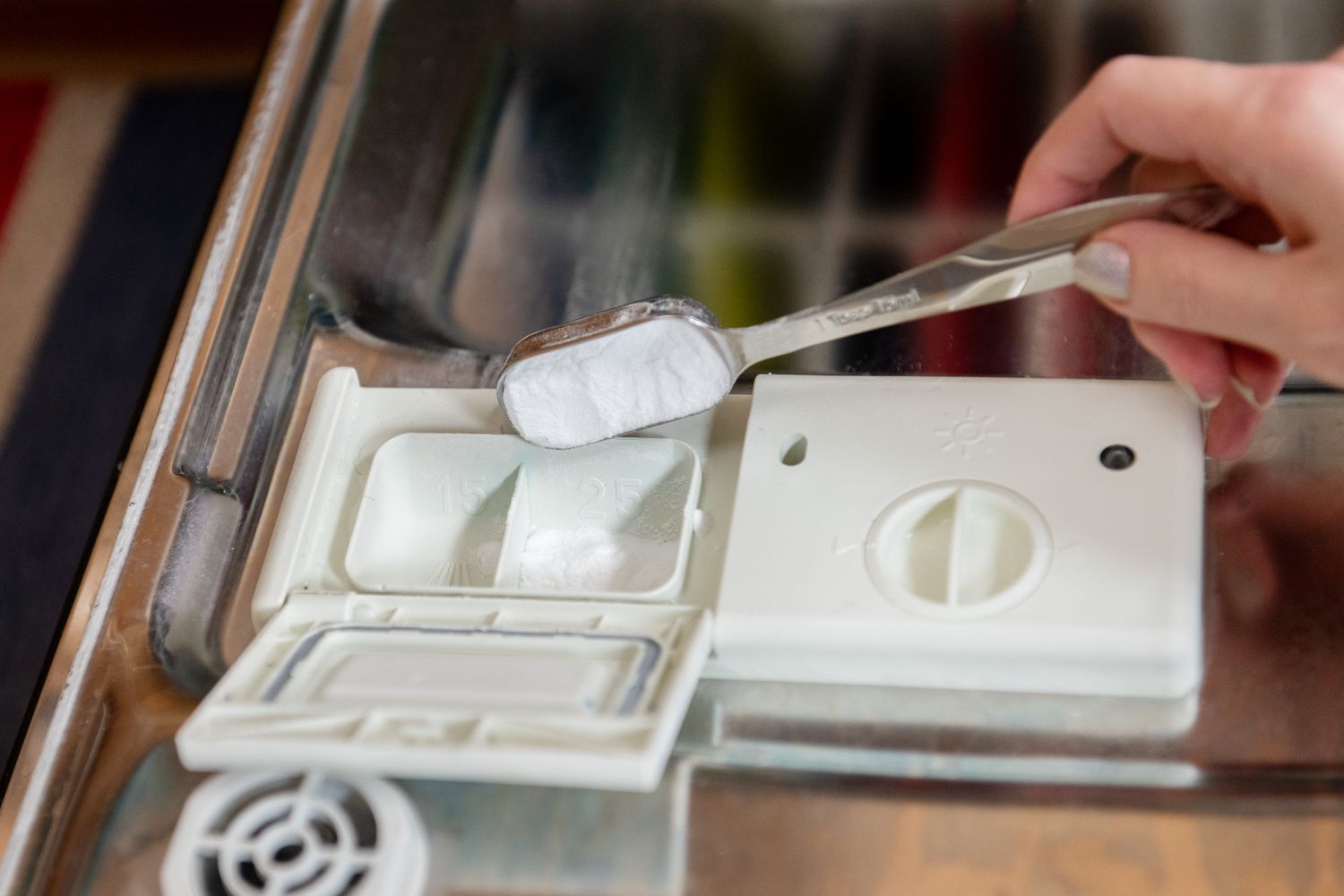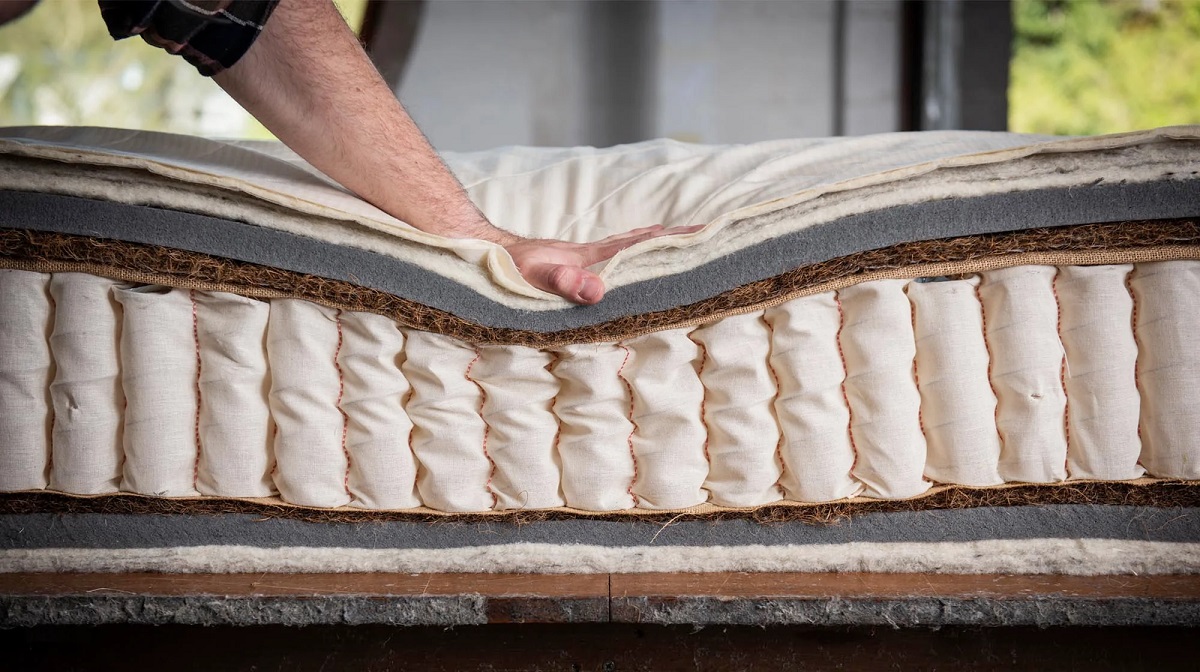Home>Interior Design>Are Organic Mattresses A Hoax? Experts Explain Green Marketing


Interior Design
Are Organic Mattresses A Hoax? Experts Explain Green Marketing
Modified: January 24, 2024
Discover the truth about organic mattresses and green marketing in interior design. Experts break down whether these eco-friendly options are worth the hype.
(Many of the links in this article redirect to a specific reviewed product. Your purchase of these products through affiliate links helps to generate commission for Storables.com, at no extra cost. Learn more)
Introduction
In recent years, there has been a growing trend towards living a healthier and more sustainable lifestyle. This shift in consumer behavior has extended to various industries, including the world of interior design. One area that has gained significant attention is the mattress industry, specifically the rise of organic mattresses.
With an increasing number of people becoming more conscious of the potential health risks associated with traditional mattresses, the demand for organic alternatives has surged. However, as with any emerging market, there are always questions and skepticism surrounding the claims made by companies. Are organic mattresses truly better for our health? Or is it all just a clever marketing ploy?
In this article, we will delve into the world of organic mattresses and explore the truth behind the green marketing claims. We will examine what organic mattresses are, the benefits they offer, and the criticisms surrounding their validity. Additionally, we will seek the insights of industry experts to gain a better understanding of the topic.
Let’s begin by defining what exactly organic mattresses are and how they differ from conventional options.
Key Takeaways:
- Organic mattresses offer a healthier sleep environment, sustainable materials, and reduced exposure to harmful chemicals. However, consumers should navigate the market with caution and consider individual preferences and circumstances.
- To make an informed decision, consumers should educate themselves about organic materials, verify certifications, compare prices, and trust their instincts. Consulting with healthcare professionals and considering other eco-friendly options can also lead to finding the most suitable mattress.
What are organic mattresses?
Organic mattresses are mattresses made from materials that have been grown or produced without the use of harmful chemicals or pesticides. Traditional mattresses often contain synthetic materials and chemicals that can release volatile organic compounds (VOCs) into the air, potentially leading to health issues for the sleeper.
In contrast, organic mattresses are made from natural materials such as organic cotton, wool, latex, or plant-based foams. These materials are sourced from sustainable farms that prioritize eco-friendly practices and avoid the use of pesticides or synthetic fertilizers. By eliminating the use of chemicals, organic mattresses aim to provide a healthier and more eco-conscious sleeping environment.
One of the key components of organic mattresses is organic cotton. Conventionally grown cotton is one of the most pesticide-intensive crops in the world, with significant environmental and health risks. Organic cotton, on the other hand, is cultivated using natural methods that promote soil health and biodiversity. It is free from pesticides and genetically modified organisms (GMOs), making it a safer and more sustainable choice.
Wool is another common material found in organic mattresses. Wool is a natural fiber that comes from sheep and is known for its breathability, moisture-wicking properties, and resistance to dust mites and mold. Organic wool is sourced from sheep that are raised in humane and sustainable conditions, without exposure to harsh chemicals or synthetic treatments.
Latex is another popular material used in organic mattresses. It can be derived from the sap of the rubber tree, making it a natural and renewable resource. Organic latex is produced without the use of synthetic additives or fillers, ensuring that it remains pure and free from harmful chemicals. It offers excellent support and comfort, making it an ideal choice for those seeking a natural mattress option.
Plant-based foams, such as those made from soy or other natural oils, are also used in some organic mattresses. These foams are produced using renewable resources and have a lower environmental impact compared to traditional petroleum-based foams.
Overall, the primary objective of organic mattresses is to provide a more sustainable, eco-friendly, and healthy sleeping surface for consumers. However, with the rise of green marketing tactics, it is important to critically evaluate the claims made by companies and understand the potential benefits and limitations of organic mattresses.
The rise of green marketing
As consumers become increasingly aware of the impact their purchasing decisions have on the environment and personal health, companies have responded by adopting green marketing strategies. Green marketing refers to the practice of promoting products and services as environmentally friendly or sustainable.
The organic mattress industry has witnessed a significant rise in green marketing efforts over the past few years. Companies have recognized the growing demand for eco-friendly products and have tailored their messaging to appeal to environmentally conscious consumers. Advertisements often highlight the use of natural and organic materials, the absence of harmful chemicals, and the sustainable production processes employed.
While green marketing has played a crucial role in raising awareness about organic mattresses, it has also led to some controversies. Critics argue that certain companies engage in “greenwashing” – a term used to describe the practice of misleading consumers by exaggerating or falsely claiming the environmental benefits of a product.
It is essential for consumers to be discerning and to look beyond surface-level marketing claims. Choosing an organic mattress involves researching and understanding the specific certifications and standards that validate a mattress as truly organic. Some well-known certifications to look for include GOTS (Global Organic Textile Standard) for textiles like cotton, GOLS (Global Organic Latex Standard) for latex, and Oeko-Tex Standard 100 for ensuring the absence of harmful substances in textiles.
By educating themselves about the various certification systems and evaluating the transparency of a company’s supply chain and manufacturing processes, consumers can make informed decisions and choose genuine organic mattresses that align with their values.
Ultimately, the rise of green marketing has undoubtedly made organic mattresses more accessible and visible to consumers interested in leading a more sustainable lifestyle. However, it is crucial to remain critical and informed consumers, asking questions, and seeking evidence to confirm the legitimacy of green marketing claims.
Understanding the organic mattress industry
The organic mattress industry has experienced significant growth in recent years as consumers increasingly prioritize health and sustainability in their purchasing decisions. Understanding the key players, materials, and certifications within the industry can help consumers navigate the market and make informed choices.
When it comes to organic mattresses, there are several important factors to consider. One of the first distinctions to understand is the difference between “natural” and “organic.” While these terms are often used interchangeably, they have distinct meanings. Natural mattresses may contain some natural materials, but they may still include synthetic components or be treated with chemicals. Organic mattresses, on the other hand, are made entirely from natural materials grown or produced without the use of harmful chemicals.
Key materials used in organic mattresses include organic cotton, organic wool, organic latex, and plant-based foams. Organic cotton is grown without the use of synthetic pesticides or fertilizers, making it a healthier and more sustainable option. Organic wool is sourced from sheep that are raised with humane and sustainable practices, ensuring it is free from harmful chemicals and provides natural temperature regulation. Organic latex is derived from the sap of rubber trees and processed without synthetic additives. Plant-based foams, such as those made from soy or other natural oils, offer a more sustainable alternative to traditional petroleum-based foams.
When shopping for an organic mattress, it’s important to look for recognized certifications that validate the organic claims. The Global Organic Textile Standard (GOTS) certification ensures that textiles, such as organic cotton, meet strict environmental and social criteria throughout the entire supply chain. The Global Organic Latex Standard (GOLS) certification verifies that latex used in mattresses is sourced from certified organic rubber plantations. Additionally, third-party certifications like Oeko-Tex Standard 100 can reassure consumers that a mattress is free from harmful substances.
Another aspect to consider is the manufacturing process of the mattress. Many organic mattress companies prioritize sustainable and ethical production methods, such as using renewable energy, reducing waste, and supporting fair trade practices. Understanding a company’s commitment to environmentally friendly practices can help consumers choose a mattress that aligns with their values.
Additionally, it’s important to note that organic mattresses can vary in terms of price, comfort, and durability. Researching customer reviews and conducting a thorough comparison of different brands and models can assist in finding the best organic mattress for individual needs and preferences. Furthermore, it’s helpful to pay attention to warranty and return policies to ensure peace of mind and a satisfactory purchasing experience.
By gaining a deeper understanding of the organic mattress industry, including the materials used, certifications, and manufacturing practices, consumers can make more informed decisions and choose a mattress that not only promotes a healthier sleep environment but also aligns with their commitment to sustainability.
Benefits of organic mattresses
Organic mattresses offer a range of benefits that make them an appealing choice for health-conscious and environmentally conscious individuals. Here are some of the key advantages of choosing an organic mattress:
- Healthier sleep environment: One of the primary benefits of organic mattresses is that they are made from natural materials that are free from harmful chemicals and toxins. Conventional mattresses often contain synthetic materials and flame retardants that release volatile organic compounds (VOCs) into the air, potentially causing respiratory issues and allergic reactions. Organic mattresses, on the other hand, use natural materials like organic cotton, wool, and latex, which are known for their breathability and hypoallergenic properties. This creates a cleaner and healthier sleep environment, reducing the risk of respiratory problems and skin irritations.
- Sustainable and eco-friendly: Organic mattresses are produced using sustainable and eco-friendly practices. The materials used, such as organic cotton and wool, are sourced from farms that prioritize organic and ethical farming methods. These farms avoid the use of synthetic pesticides and fertilizers, reducing their impact on the environment. Additionally, organic latex and plant-based foams used in some organic mattresses are made from renewable resources, further minimizing their carbon footprint.
- Support and comfort: Organic mattresses are designed to provide excellent support and comfort for a restful night’s sleep. Organic latex, for instance, conforms to the body’s contours, relieving pressure points and promoting healthy spinal alignment. Organic wool acts as a natural temperature regulator, keeping sleepers cool in the summer and warm in the winter. The use of natural materials ensures optimal airflow, reducing the likelihood of overheating during sleep.
- Durability: Organic mattresses are often crafted with high-quality materials that are built to last. The absence of synthetic materials and chemicals helps maintain the integrity of the mattress over time. While organic mattresses may require a slightly higher upfront investment, their durability can offset long-term costs, as they tend to have a longer lifespan than conventional mattresses.
- Reduced environmental impact: Choosing an organic mattress supports sustainable practices and reduces the overall environmental impact. Organic farming methods prioritize soil health, water conservation, and biodiversity, contributing to healthier ecosystems. Additionally, the use of renewable resources and non-toxic production processes in organic mattresses helps to minimize waste and reduce the demand for petroleum-based materials.
It’s important to note that individual experiences with organic mattresses may vary, and personal preferences should be taken into account when selecting a mattress. However, the overall benefits of organic mattresses make them an attractive choice for those who prioritize their health and the health of the planet.
When considering an organic mattress, look for third-party certifications such as GOTS or GOLS to ensure the product meets organic standards. Be wary of vague or misleading green marketing claims.
The truth behind the green marketing claims
While many organic mattress companies are genuine in their commitment to sustainability and environmental responsibility, it is important to understand the truth behind green marketing claims and to navigate the market with a critical eye.
One common concern is the practice of “greenwashing,” where companies exaggerate or make false claims about the environmental benefits of their products. To determine the validity of green marketing claims, consumers should look for credible certifications and standards that validate a product’s organic or eco-friendly claims. Certifications such as GOTS (Global Organic Textile Standard) and GOLS (Global Organic Latex Standard) provide assurance that the mattress meets strict standards throughout the production process.
Another aspect to consider is the overall sustainability of the company’s practices and supply chain. It is important to research the company’s commitment to ethical sourcing, responsible manufacturing, and eco-friendly processes. Transparency in their practices, such as sharing information about the origin of materials and production methods, can help consumers make more informed decisions.
It is also important to recognize that while organic mattresses offer several benefits, they may not be the perfect solution for everyone. Factors such as personal comfort preferences, budget constraints, and individual health conditions should be taken into consideration when making a purchasing decision. Organic mattresses are not a guaranteed cure-all for sleep issues or health problems, and individuals should consult with their healthcare provider if they have specific concerns.
Furthermore, it is crucial to recognize that the term “organic” can be subjective and interpreted differently across different industries and countries. Regulations and standards may vary, so consumers should familiarize themselves with industry-specific definitions and requirements to understand what constitutes an organic mattress.
To ensure that the green marketing claims align with reality, it is recommended to read customer reviews and seek the opinions of independent experts who possess deep knowledge of eco-friendly practices and materials. Reliable sources can provide valuable insights into the credibility of green marketing claims and help consumers make educated decisions.
Ultimately, while green marketing has played a pivotal role in raising awareness about organic mattresses and promoting sustainable practices, consumers must be discerning and informed. Taking the time to research and verify the claims made by companies can help separate the genuine eco-friendly options from those using green marketing as a mere marketing tactic.
Criticisms and skepticism surrounding organic mattresses
While organic mattresses have gained popularity among health-conscious and environmentally conscious consumers, there are criticisms and skepticism surrounding them that warrant consideration. Here are some of the common concerns raised about organic mattresses:
- Cost: One of the primary criticisms of organic mattresses is their higher price compared to conventional mattresses. The use of organic materials and sustainable production practices often leads to an increase in manufacturing costs, which is ultimately reflected in the price for consumers. This higher cost can make organic mattresses less accessible to those on a tight budget.
- Comfort and support: Another criticism is that the comfort and firmness levels of organic mattresses may not meet the preferences of all sleepers. Personal comfort is subjective, and while some individuals find organic mattresses to be comfortable and supportive, others may prefer the feel of conventional mattresses. It’s essential for individuals to test different mattress options to find the one that suits their specific needs.
- Limited availability: Availability can be a challenge when it comes to organic mattresses. While there has been an increase in demand, organic mattresses may not be as widely available as conventional mattresses in certain regions or retail stores. Individuals may need to explore online options or niche retailers specializing in organic bedding to find the mattress they desire.
- Conflicting certifications: The presence of multiple certifications and standards can lead to confusion for consumers. Different certifying bodies may have varying requirements and may prioritize different aspects of sustainability and organic practices. This can make it challenging for consumers to navigate and fully understand the significance of each certification.
- Environmental impact of raw materials: Critics argue that while organic mattresses promote sustainability, the production of natural materials such as organic cotton and latex still requires water, energy, and other resources. Additionally, the transportation of these materials from their source to the mattress manufacturer may contribute to carbon emissions. While organic materials are generally considered more environmentally friendly than their synthetic counterparts, some argue that reducing overall consumption and waste may have a more significant impact on sustainability.
- Lack of long-term studies: Critics also point out a lack of comprehensive and long-term studies that definitively prove the health and environmental benefits of organic mattresses. While organic materials are generally considered healthier and safer due to the absence of harmful chemicals, limited scientific research specifically focused on organic mattress impacts makes it difficult to make conclusive claims about their long-term effects.
These criticisms and skepticism surrounding organic mattresses highlight the need for consumers to carefully evaluate their individual priorities, budget constraints, and comfort preferences when considering a mattress purchase. It is important to weigh the potential benefits and drawbacks while also considering alternative eco-friendly options that may better align with personal preferences and values.
Expert opinions on organic mattresses and green marketing
Expert opinions on organic mattresses and green marketing offer valuable insights into the industry and can help consumers make informed decisions. While individual experts may have varying viewpoints, here are some common perspectives from professionals in the field:
Health and Wellness Experts: Many health and wellness experts acknowledge the potential benefits of organic mattresses in promoting a healthier sleep environment. They emphasize the importance of reducing exposure to harmful chemicals commonly found in traditional mattresses. However, they also caution that the health benefits of organic mattresses should not be overstated and that other lifestyle factors, such as diet and stress management, also play a significant role in overall well-being.
Sustainability Advocates: Sustainability advocates emphasize the environmental benefits of organic mattresses and support the use of natural, renewable, and eco-friendly materials. They appreciate the efforts of companies that prioritize organic farming practices, ethical sourcing, and responsible manufacturing. However, they also encourage consumers to consider the broader impacts of their purchasing decisions and to explore other ways to reduce their environmental footprint beyond just choosing an organic mattress.
Consumer Advocacy Groups: Consumer advocacy groups often provide objective analysis and assessments of green marketing claims. They highlight the importance of transparency and urge consumers to look beyond catchy marketing phrases and labels. These groups encourage consumers to research and verify the organic certifications and standards used by mattress companies to ensure that claims are substantiated and align with credible industry guidelines.
Industry Insiders: Professionals within the mattress industry acknowledge the rise of green marketing and the increasing demand for organic mattresses. They encourage companies to be authentic and transparent in their messaging to build trust with consumers. They also emphasize the importance of meeting recognized organic certifications and standards and investing in sustainable manufacturing practices to uphold the integrity of the organic mattress market.
It is important for consumers to conduct their own research and draw insights from various expert opinions when considering an organic mattress purchase. By consulting a range of perspectives, individuals can gain a more comprehensive understanding of the industry and make informed decisions based on their needs, values, and priorities.
Tips for consumers: How to navigate the organic mattress market
Navigating the organic mattress market can be a daunting task, especially with the abundance of options and green marketing claims. To help consumers make an informed decision, here are some tips to consider:
- Educate yourself: Take the time to educate yourself about organic mattresses, including the materials used, certifications, and manufacturing processes. Familiarize yourself with industry-specific certifications such as GOTS and GOLS, and understand what they signify in terms of organic and sustainable practices.
- Research brands and reviews: Investigate different organic mattress brands and read customer reviews. Look for feedback on factors such as comfort, durability, and customer service. Independent reviews and testimonials can provide valuable insights into the quality and performance of various mattresses.
- Verify certifications: When considering an organic mattress, check for relevant certifications on the manufacturer’s website or product labels. Confirm that the certifications are from reputable, third-party organizations and verify their authenticity.
- Compare prices and warranties: Compare prices among different organic mattress brands to find the best value for your budget. Take into account warranty details, including the length and coverage provided. Consider the long-term investment and potential savings of a durable organic mattress.
- Visit showrooms or request samples: If possible, visit showrooms or request samples to experience the comfort and feel of organic mattresses firsthand. Testing out mattresses in person can help you determine which type of organic mattress suits your preferences and optimizes your sleep quality.
- Ask questions: Don’t hesitate to contact mattress manufacturers directly to ask questions about their materials, certifications, and manufacturing processes. Reputable companies should be transparent and willing to provide information to assist you in making an informed decision.
- Consider other eco-friendly options: If an organic mattress is outside your budget or preference, consider other eco-friendly mattress options. Look for mattresses made from sustainable materials, such as natural latex or plant-based foams. Ensure these alternatives are free from harmful chemicals and have credible certifications.
- Consult with healthcare professionals: If you have specific health concerns or conditions, consult with healthcare professionals for guidance on choosing the most suitable mattress for your individual needs.
- Trust your instincts: Ultimately, trust your instincts and choose a mattress that feels right for you. Prioritize comfort, support, and personal preferences to ensure you find a mattress that promotes restful sleep and overall well-being.
By following these tips, consumers can navigate the organic mattress market with confidence and make a well-informed decision that aligns with their health, sustainability, and comfort goals.
Conclusion
The organic mattress market has experienced significant growth as consumers prioritize their health and the environment. While green marketing claims have helped raise awareness about the benefits of organic mattresses, it is important for consumers to navigate the market with caution and make informed decisions.
Organic mattresses offer numerous benefits, including a healthier sleep environment, sustainable materials, and reduced exposure to harmful chemicals. However, criticisms and skepticism surrounding their cost, comfort, and limited availability should be taken into account. It is crucial to recognize that individual preferences and circumstances play a significant role in choosing the right mattress.
Experts’ opinions provide valuable insights into the organic mattress industry. Health and wellness experts emphasize reducing exposure to toxins, while sustainability advocates urge consumers to consider the broader environmental impact of their purchases. Consumer advocacy groups advise researching and verifying organic certifications, and industry insiders emphasize the importance of transparency and responsible manufacturing practices.
To navigate the organic mattress market, consumers should educate themselves about organic materials, certifications, and manufacturing processes. Researching brands, comparing prices, and reading customer reviews can provide valuable information. Verifying certifications and even visiting showrooms or requesting samples can help in the decision-making process.
It is important to ask questions and consult with healthcare professionals, especially for those with specific health concerns. Considering other eco-friendly options and trusting personal instincts can also lead to finding the most suitable mattress.
In conclusion, the organic mattress market offers a range of options for health-conscious and environmentally conscious consumers. By conducting thorough research, verifying certifications, and considering individual needs and preferences, consumers can make informed choices that promote a healthier sleep environment and contribute to a more sustainable future.
Frequently Asked Questions about Are Organic Mattresses A Hoax? Experts Explain Green Marketing
Was this page helpful?
At Storables.com, we guarantee accurate and reliable information. Our content, validated by Expert Board Contributors, is crafted following stringent Editorial Policies. We're committed to providing you with well-researched, expert-backed insights for all your informational needs.














0 thoughts on “Are Organic Mattresses A Hoax? Experts Explain Green Marketing”